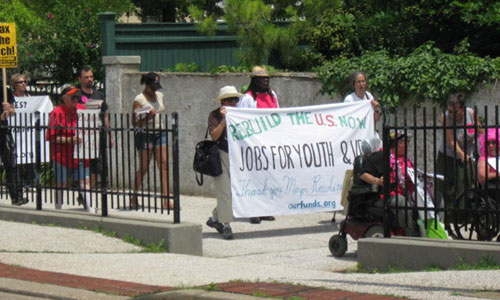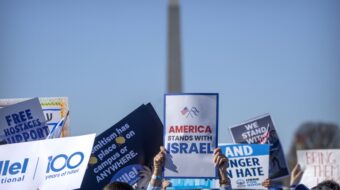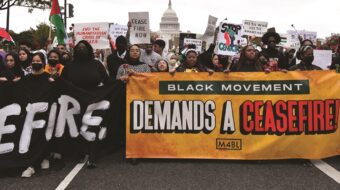
BALTIMORE – The U.S. Conference of Mayors approved a resolution June 20 calling for a quick end to the wars in Afghanistan and Iraq and transfer of the $129 billion spent on those wars each year to job-creating domestic programs in the nation’s cities.
The vote came at the end of the mayors’ 79th annual meeting here, dominated by deep concern at the steep downward economic spiral of the nation’s cities with lower revenues forcing disastrous budget cutbacks and mass layoffs. The mayors warned of a “lost decade” for the cities with recovery from double-digit unemployment not expected “until 2020 at the earliest.”
As they met, close to a hundred Maryland activists rallied, sang, and marched in the Baltimore heat June 18 to bring home the message to the mayors: “Bring the war dollars home to our cities and communities.”
Los Angeles Mayor Antonio Villaraigosa, newly elected Conference of Mayors president, endorsed the antiwar resolution during an appearance June 19 on “Meet the Press.”
“There are some cities that are not going to recover … for another 20 years,” Villaraigosa said. “The impact of this recession is real.” Villaraigosa said something is out of kilter when “we build bridges in Baghdad and Kandahar and not in Baltimore and Kansas City.”
Charlottesville, Va, Mayor Dave Norris praised the resolution after it was overwhelmingly approved. “It is our constituents who are sent off to fight and die in these wars, who are asked to fund these wars with their tax dollars,” he said. “And it is our communities that struggle when huge sums are being diverted from local priorities to military adventures and ‘nation building’ abroad… It is time to do some nation-building here at home.”
Kittie Piercy, mayor of Eugene, Ore., said the resolution calls on the mayors to “begin the journey of turning war dollars back into peace dollars, of bringing our loved ones home and focusing our national resources on building security and prosperity at home.”
Muhammad Younis Nawandish, mayor of Kabul, Afghanistan, expressed reservations about a quick U.S. troop withdrawal, telling a luncheon of the mayors, June 18, that it may open the way for the Taliban.
Jacquiline Cabasso, U.S. coordinator of Mayors for Peace, spoke to Nawandish after his speech, showing him material from her organization. He promptly signed up to be a member, charging that decades of war have destroyed “90 percent” of Kabul just as atomic bombing destroyed Hiroshima and Nagasaki.
The grassroots events outside the conference were organized by the Fund Our Communities, Bring The War Dollars Home Coalition. It includes Veterans For Peace, Peace Action, the Algebra Project, AFSC, Full Employment Baltimore, the Communist Party of Maryland, the Green Party, Generations for Peace and Democracy, Code Pink, Baltimore ANSWER and others.
The opening rally, held at the St. Vincent de Paul church parking lot across from Baltimore’s fabled Shot Tower, and next to a small park populated by homeless people, heard from various speakers as well as the Charm City Labor Chorus before the marchers took off for the hotel where the conference was being held.
Chanting and carrying colorful flags, banners and signs, the marchers went through downtown Baltimore and Baltimore traffic. Along the march route, Maria Allwine, one of the coalition organizers, told the People’s World, “I’ve talked to six mayors in the past few days. The mayors get it. They’re in the trenches. They’re on the front lines. They’re the ones trying to provide more services with ever-dwindling resources. We expect them to pass the Mayors for Peace resolution, and hope they will use their bully pulpit to take it to the U.S. Congress and make an issue of it.”
Tim Wheeler contributed to this article.
Photo: Maryland peace activists’ march June 18 urges the nation’s mayors to call for “bringing the war dollars home to our cities and communities.” PW/Jim Baldridge

MOST POPULAR TODAY

High Court essentially bans demonstrations, freedom of assembly in Deep South

Zionist organizations leading campaign to stop ceasefire resolutions in D.C. area

U.S. imperialism’s ‘ironclad’ support for Israel increases fascist danger at home


UN warns that Israel is still blocking humanitarian aid to Gaza






Comments